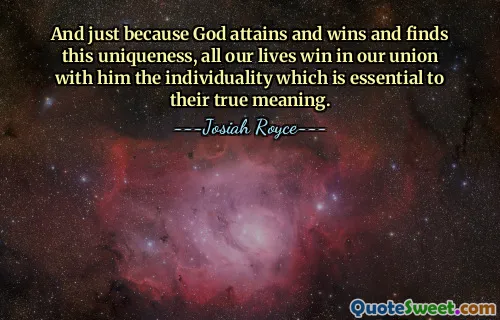Josiah Royce was an influential American philosopher born in 1855 and known for his work on idealism and loyalty. He studied at Harvard University and later became a professor there. Royce’s philosophical inquiries emphasized the importance of community and the role of loyalty in ethical life. He believed that individual identity is shaped by one's commitment to a broader social context, making his ideas significant in both philosophy and social ethics. Royce's major works include "The Spirit of Modern Philosophy" and "The Philosophy of Loyalty," where he articulates his thoughts on how loyalty serves as a fundamental moral principle that can guide individual actions within society. He argued that true loyalty requires a devotion to ideals that transcend personal interests, suggesting that ethical actions arise from a commitment to a greater cause. His legacy extends beyond philosophy to influence various fields, including theology and education. Royce's emphasis on community, ethics, and loyalty resonates with contemporary discussions around social responsibility and interconnectedness. His contributions are essential for understanding the interplay between individual and collective identity in ethical considerations.
Josiah Royce was an influential American philosopher born in 1855 and known for his work on idealism and loyalty. He studied at Harvard University and later became a professor there. Royce’s philosophical inquiries emphasized the importance of community and the role of loyalty in ethical life. He believed that individual identity is shaped by one's commitment to a broader social context, making his ideas significant in both philosophy and social ethics.
Royce's major works include "The Spirit of Modern Philosophy" and "The Philosophy of Loyalty," where he articulates his thoughts on how loyalty serves as a fundamental moral principle that can guide individual actions within society. He argued that true loyalty requires a devotion to ideals that transcend personal interests, suggesting that ethical actions arise from a commitment to a greater cause.
His legacy extends beyond philosophy to influence various fields, including theology and education. Royce's emphasis on community, ethics, and loyalty resonates with contemporary discussions around social responsibility and interconnectedness. His contributions are essential for understanding the interplay between individual and collective identity in ethical considerations.
More »
Today Birthdays
1955 -
Max Lucado
1946 -
John Piper
1842 -
William James
1907 -
Abraham Joshua Heschel
1887 -
Aldo Leopold
1755 -
Alexander Hamilton
1976 -
Alethea Kontis
1971 -
Mary J. Blige
1825 -
Bayard Taylor
1943 -
Jim Hightower
1885 -
Alice Paul
1923 -
Carroll Shelby
1928 -
David L. Wolper
1954 -
Kailash Satyarthi
1972 -
Amanda Peet
1946 -
Naomi Judd
1970 -
Malcolm D. Lee
1955 -
Christian Marclay
1973 -
Rahul Dravid
1987 -
Jamie Vardy
1942 -
Clarence Clemons
1992 -
Fatima Sana Shaikh
1948 -
Larry Harvey
1930 -
Rod Taylor
